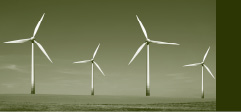Energy
Land use can have a profound impact on a State's energy consumption, just as energy consumption can have a profound impact on a State's land use.
A regulatory structure that fails to encourage energy efficiency inevitably encourages sprawling development and wasteful construction practices. But promoting compact development that offers a variety of transportation choices can reduce energy use, air pollution and greenhouse gas emissions. In a time of wildly fluctuating energy prices and rising costs associated with climate change, energy-efficient development also can save money for governments, businesses and private citizens.
In this section, we discuss ways to discourage sprawl, reduce greenhouse emissions and provide citizens with more efficient transportation alternatives.
Policies
- Help cities and counties understand the link between smart growth and energy efficiency
- Price utility infrastructure to support infill development
- Leverage energy-efficiency funds for better development patterns
- Promote district energy and Combined Cooling, Heating and Power systems
- Promote energy efficiency in multifamily housing
- Expand commuter tax credit programs to support walking and bicycling
- Develop a tax incentive for alternatives to the automobile


